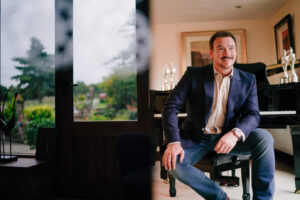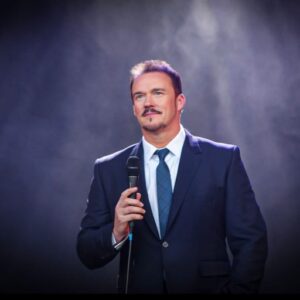Dave Woodhall talks to Russell Watson, the people’s tenor and boxing fan.
Russell Watson came to fame by singing at football matches and became known as ‘the people’s tenor’. It’s not the usual career path for a classical artist, whose somewhat unorthodox approach to his art was further shown by his knowledge of boxing and his, like my, dislike of how the noble art has become more of a spectacle than a sport. We couldn’t understand how the top heavyweights never fight each other, either. Eventually we got onto the subject of music.
Are you still known as that big bloke who sings at football matches or are you beyond that now?
“That was a very long time ago. The sporting events I used to perform at were predominantly at the turn of the century and since then I’ve not done a great deal of them. I think the last really big thing I did was the Commonwealth Games opening ceremony in Manchester in 2004.”
Manchester had you, last year Birmingham had Ozzy Osbourne. That makes you Ozzy’s support act.
“I’ll take that.”
Again it’s going back, but do you find that people still define you by your illness? (Russell suffered brain tumours in 2006 and 2007.)

“I don’t know, really. One of the things you wouldn’t want to be defined by is illness. What I went through was a very difficult period. I went to bed one night with a brain tumour, it haemorrhaged while I was asleep, I didn’t wake up next morning and I had to have emergency surgery. Fifteen years on we’re still talking about it and that’s fine if it helps someone.
“I get lots of mail and messages from people saying my story and everything I went through, how I got through it and how it inspired them during their struggles. Things like that do encourage me to talk about it but it does often become the subject matter of most interviews and more often than not it ends up bein the headline and you think this was fifteen years ago. It’s not a headline anymore.
“I don’t want to be defined by that because it still intimates something. I’m as fit as I’ve ever been. It’s non-stop all day, it happened all those years ago and it’s no longer, thang God, affecting me anymore.”
Did the illness affect your voice permanently?
“No, it did for a while. For two or three years it affected not just the process of singing but it also affected my confidence as well because when you go through something like that, it knocked me for six. I ended up going through 25 sessions of radiotherapy and I was wiped out. I had nothing left in the tank, absolutely threadbare. I’d gained a huge amount of weight, my hair had fallen out, I was on all sorts of medication, then one morning I looked at myself in the mirror and I was virtually unrecognisable. To rebuild from that took a huge amount of time and effort, regaining my confidence was in many respects a longer road than regaining my voice.
Laymen like myself don’t appreciate how much you have to keep your voice in condition whether through illness or whether something like lockdown made it so difficult not knowing when they would finally get back on stage.
“No question, and also when you’re in the public eye as well. With the invention of social media everyone has a voice and they can directly voice their opinion of you. It’s a scary scenario but this is the world we live in and you can understand why so many people in the public eye are feeling depressed or threatened. I generally avoid all that. If I get any comment from anyone I just block then, don’t want to know. In the early stages of my career I got a lot of criticism and I got a wonderful piece of advice from Mel C of the Spice Girls. She guested on one of my shows and she said, ‘Never believe your own press. Just ignore it.’ That was good advice – you have to take the good with the bad.”
You’re doing a UK tour of cathedrals. Is this something you’ve done before?

“I’ve played them before but not this type of tour. I’m really enjoying it – the cathedrals, abbeys, churches. These places were designed for a noisy human like me and the voice just soars. I did St Paul’s Cathedral, it’s got an eleven second delay, which means the sound can carry for eleven seconds. It’s phenomenal.”
It’s also incredible to think that they were built hundreds of years ago and the acoustics were comparable to Symphony Hall.
“That’s one of my favourite venues. The acoustics are second to none. It’s a tremendous place to sing and I also like the proximity to the audience.”
Locally you’re doing Lichfield Cathedral on October 12h.
“That’s a new one to me. I’m not sure how big it is; it’s one of the few in the UK with three spires so it must be a decent size. It’s not too far from home, either. I live in Cheshire close to the Staffordshire border.”
What sets are you performing on these dates?
“It’s not all religious stuff. We’ve got some musical theatre repertoire, some from Les Mis, a couple of off the wall numbers a bit different from the classical repertoire but it’s the Ava Marias, the big hymns – Abide With Me, How Great Thou Art. It’s a mixture.”
After these dates and bearing in mind your usual venues, is there anywhere else you fancy playing?
“I did want to take a year off from performing in theatres and do something slightly different but if I could choose anywhere, it’s difficult because I’ve sung at some of the premier theatres in the world so maybe La Scala. I’ve not played there yet. I used to think the Royal Albert Hall was the ultimate but I’ve sung there a lot of times. it never loses its appeal but La Scala is somewhere I could be excited about.”
Maybe you could go back to the beginning and start off at the San Siro.
“Yes, maybe.”
Russell Watson plays Lichfield Cathedral on Thursday 12th October. Tickets can be obtained from russellwatson.com.


